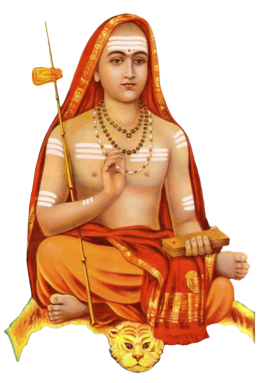विरक्त एव शक्नोति त्यक्तुं ब्रह्मणि निष्ठितः ॥ ३७३ ॥
virakta eva śaknoti tyaktuṃ brahmaṇi niṣṭhitaḥ || 373 ||
पक्षौ विजानीहि विचक्षण त्वम् ।
विमुक्तिसौधाग्रलताधिरोहणं
ताभ्यां विना नान्यतरेण सिध्यति ॥ ३७४ ॥
pakṣau vijānīhi vicakṣaṇa tvam |
vimuktisaudhāgralatādhirohaṇaṃ
tābhyāṃ vinā nānyatareṇa sidhyati || 374 ||
समाहितस्यैव दृढप्रबोधः ।
प्रबुद्धतत्त्वस्य हि बन्धमुक्तिः
मुक्तात्मनो नित्यसुखानुभूतिः ॥ ३७५ ॥
samāhitasyaiva dṛḍhaprabodhaḥ |
prabuddhatattvasya hi bandhamuktiḥ
muktātmano nityasukhānubhūtiḥ || 375 ||
तच्चेच्छुद्धतरात्मबोधसहितं स्वाराज्यसाम्राज्यधुक् ।
एतद्द्वारमजस्रमुक्तियुवतेर्यस्मात्त्वमस्मात्परं
सर्वत्रास्पृहया सदात्मनि सदा प्रज्ञां कुरु श्रेयसे ॥ ३७६ ॥
taccecchuddhatarātmabodhasahitaṃ svārājyasāmrājyadhuk |
etaddvāramajasramuktiyuvateryasmāttvamasmātparaṃ
sarvatrāspṛhayā sadātmani sadā prajñāṃ kuru śreyase || 376 ||
त्यक्त्वा जातिकुलाश्रमेष्वभिमतिं मुञ्चातिदूरात्क्रियाः ।
देहादावसति त्यजात्मधिषणां प्रज्ञां कुरुष्वात्मनि
त्वं द्रष्टास्यमनोऽसि निर्द्वयपरं ब्रह्मासि यद्वस्तुतः ॥ ३७७ ॥
tyaktvā jātikulāśrameṣvabhimatiṃ muñcātidūrātkriyāḥ |
dehādāvasati tyajātmadhiṣaṇāṃ prajñāṃ kuruṣvātmani
tvaṃ draṣṭāsyamano’si nirdvayaparaṃ brahmāsi yadvastutaḥ || 377 ||
स्वस्थाने विनिवेश्य निश्चलतनुश्चोपेक्ष्य देहस्थितिम् ।
ब्रह्मात्मैक्यमुपेत्य तन्मायातया चाखण्डवृत्त्यानिशं
ब्रह्मानन्दरसं पिबात्मनि मुदा शून्यैः किमन्यैर्भृशम् ॥ ३७८ ॥
svasthāne viniveśya niścalatanuścopekṣya dehasthitim |
brahmātmaikyamupetya tanMāyātayā cākhaṇḍavṛttyāniśaṃ
brahmānandarasaṃ pibātmani mudā śūnyaiḥ kimanyairbhṛśam || 378 ||
Other things—pursued as means of happiness.
Vivekachudamani – Introduction
1: Devoted Dedication
2: Glory of Spiritual Life
3: Unique Graces in Life
4-7: Miseries of The Unspiritual Man
8-13: Means of Wisdom
14-17: The Fit Student
18-30: The Four Qualifications
31: Bhakti – Firm and Deep
32-40: Courtesy of Approach and Questioning
41-47: Loving Advice of the Guru
48-49: Questions of the Disciple
50: Intelligent Disciple – Appreciated
51-55: Glory of Self-Effort
56-61: Knowledge of the Self-Its Beauty
62-66: Direct Experience – Liberation
67-71: Discussion on Questions Raised
72-75: Gross Body
76-82: Sense Objects a Trap – Man Bound
83-86: Fascination for Body Criticised
87-91: Gross Body Condemned
92: Organs of Perception and Action
93-94: Inner Instruments
95: The Five Pranas
96-101: Subtle Body – Effects
102: Functions of Prāna
103-105: Ego Discussed
106-107: Infinite Love – the Self
108-110: Māyā – Pointed Out
111-112: Rajoguņa – Nature and Effects
113-116: Tamoguņa – Nature and Effects
117-119: Sattvaguņa – Nature and Effects
120-121: The Causal Body – Its Nature
122-123: Not-Self – Description
124-135: The Self – Its Nature
136: Advice for Self-control
137-142: What is Bondage – The Reply
143-144: The Powers – Agitation and Veiling
145-146: Bondage in Action
147-153: Ātman and Anātman – Discrimination
Negation of the Kośas
154-164: – Annamaya kośa (Food sheath)
165-166: – Prņamaya kośa (Vital air sheath)
167-183: – Manomaya kosa (Mental sheath)
184-188: – Vijnanamaya kośa (Intellectual sheath)
189-191: Ātman – Unattached
192-193: What is Liberation? – Disciple
194-206: Self-Knowledge gives Liberation
207-210: Anandamaya kośa (Bliss sheath)
211: Ātman – Other than the Five Kośas
212: What is Ātman? – Disciple
213-225: Nature of the Self – Discussion
226-236: All Manifestation Absolute
237-240: Brahman – Its Nature
241-249: That Thou Art – Explanation
250-253: Attitude in Meditation
254-266: Aids to Meditation
267-276: Give up Vāsanās – the Method
277-292: End Superimposition – The Means
293-297: The Perceived I’ Factor – False
298-309: Condemnation of the Ego
310-319: Actions, Thoughts and Vāsanās – Renounce
320-329: Total Vigilance – Its Price
330-338: In the One, No Plurality
339-348: Spiritual Growth – the Secret
349-353: Cause-Effect – False
354-372: Samadhi – Its Nature
373-378: Fully Detached – Samadhi Easy
379-383: Meditation – the Technique
384-397: Continuous Attention to Self
398-406: No Diversity in Reality
407-413: Ātma-vicāra – Contemplation
414-418: Give up Perceptions
419-425: The Science of Reality – Its Benefits
426-445: Signs of a Realised Seer
446-464: Prārabdha for a Saint
465-471: There is No Plurality
472-479: Experience of Selfhood
480-520: Practice of Knowledge – Disciple
521-575: Final Words of Advice
576-578: Blessed Disciple Liberated
579-581: The Glory of the Textbook

Vivekachudamani – Verses 373-378 – Vivekachudamani Verses 373-378 – By Adi Sankaracharya – In Sanskrit with English Meaning, Transliteration, Translation, Commenary, Lyrics, Audio – Vivekachudamani-373-378
